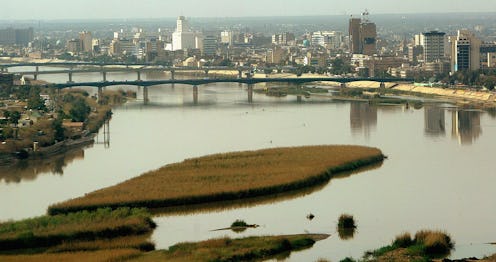News
Baghdad Has Its First Female Mayor
Baghdad has just elected Dr. Zekra Alwach to be the only female mayor of any Arab League capital, replacing a man that regular citizens long considered a “clown,” according to Middle East Eye. Former mayor Naim Aboub was dismissed from his post last week by Prime Minister Haider al-Abadi, who then appointed Alwach to fill the vital role. This makes Alwach Baghdad’s first female mayor and, according to Newsweek, the first woman to hold such a post in Iraqi history. Needless to say, the news has been received as evidence of a breakthrough for women’s rights in a country that is not known for its gender equality.
Alwach is a civil engineer and director general of the Ministry of Higher Education. Considered a technocrat, she has no previous political credentials. It would be intimidating at the best of times to step into the most important administrative role in a major city, but Baghdad represents an unusually unwieldy metropolis, plagued as it is by sectarian violence and endemic corruption. The city is also faced with the rising threat of ISIS; the group controls large swathes of northern Iraq, and has made advances in Anbar province, threatening the capital.
Alwach will work directly with Abadi, a level of influence that women seldom enjoy in Iraq, where only two of 29 ministers are female. Last year, Human Rights Watch drew attention to the increase in child marriages in Iraq: a shocking 25 percent of girls marry before the age of 18 in a country where a quarter of women over 12 are illiterate. Last year, the Iraqi council of ministers approved the Ja'fari law: a statute dealing with “personal status” that, according to The Guardian, infringes on women’s rights to such a degree as to contravene Iraqi laws, international agreements, and U.N. conventions. "It is a divine Sharia, it is a must," said a female MP in defense of the bill.
Before that disturbing regression, UN Women reported that female political representation had improved in the wake of the local Iraqi elections of 2013. Forty percent of the people who showed up to cast a vote were women, and certain councils saw an increase in women’s representation. The successful candidates expressed a desire to work for change — and hopefully Baghdad’s new mayor can now become a part of that project.
Despite quotas in place in countries such as Egypt and Iraq, women’s political representation across the Muslim world is fairly dire. The World Economic Forum’s Gender Gap Index periodically ranks women’s participation in society; in 2010, 20 of the 25 lowest-ranking countries were Muslim-majority nations. But during the “Arab Spring,” the flames of dissent that raced across the region were fanned significantly by female participation, and Zekra Alwach is not the first woman in the area to make a splash as mayor.
Here’s a couple other situations in which badass women have taken the mayoral reigns:
Turkey
Until the 2014 local elections, no woman had ever been elected to govern a metropolitan city in Turkey. After the elections, three large cities (and four provinces) had a woman at the helm. This may not sound like a big deal, since the country has 81 municipalities (and a dismal 14 percent of parliament is female), but it’s a start.
The youngest mayor also happened to be a woman: Rezan Zuğurli, mayor of Lice, is a Kurdish former political prisoner and a staunch defender of women’s rights. Zuğurli is only 25, and currently appealing another prison sentence — charged with subversion, she claims the case rests on an issue of mistaken identity. Despite reforms, it’s not easy to be a politically active Kurd in Erdoğan's Turkey.
Bethlehem
Vera Baboun is a Palestinian Christian, and has been the first female mayor of Bethlehem since October 2012. She was an underdog, according to Al-Monitor: an unknown English literature professor up against better-known male candidates. She ended up winning the mayorship, along with the majority of the fifteen council seats. Since then, it seems, her major focus has been alleviating the city’s economic hardships and chronic underemployment by getting Christmas tourism booming.
We love to see a woman taking initiative, but unfortunately not everyone does. After the election, Baboun was the victim of a malicious smear campaign, thought to be a product of the tension between the Christian minority and Muslim majority in the city.
Afghanistan
President Hamid Karzai appointed the first female mayor in his country’s history in 2008, sending Azra Jafari to look after Nili, remote capital of the Daykundi Province. Jafari lived in rustic conditions and on a salary of only $76 a month, but after four years earned plaudits for her hard work and “enormous strides” in office. Overcoming gender-based discrimination has been a massive part of her experience, she told the Guardian.
There are plenty of men here with no ambition to work, who are bad at their jobs and over whom a lot of money has been wasted. Because they are men, no one really questions them and asks "as a man, how successful have you managed to be?" But as the only female mayor among 180 others, the first question I'm always asked, wherever I am, is "show us what you've done for your people."
Despite the difficulties, she continues to work and is now addressed, respectfully, as “Mr. Mayor.”
Gender inequality nevertheless continues to plague the Afghan political system — at the start of February, women took to the streets to protest the absence of female representatives in the new cabinet. One hopes that at some stage — sometime soon — these women will no longer be the exception that proves the male-dominated rule.
Images: DVIDSHUB, Catholic Church England and Wales/Flickr Creative Commons; Getty Images (2)
